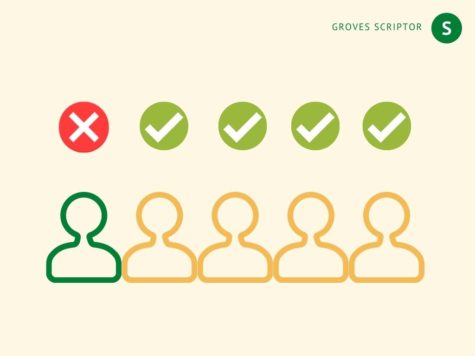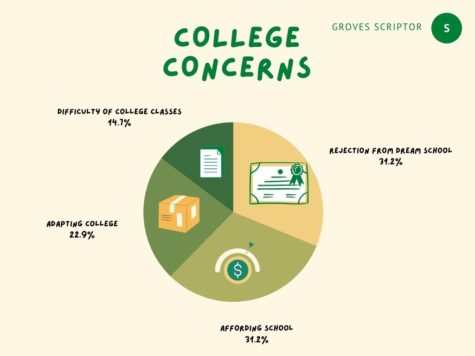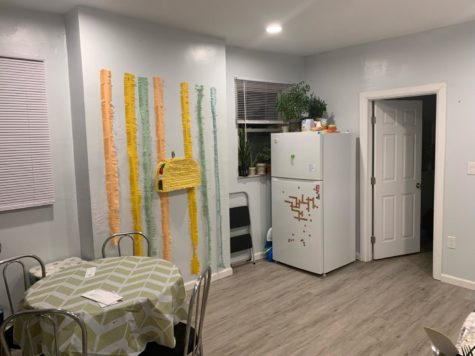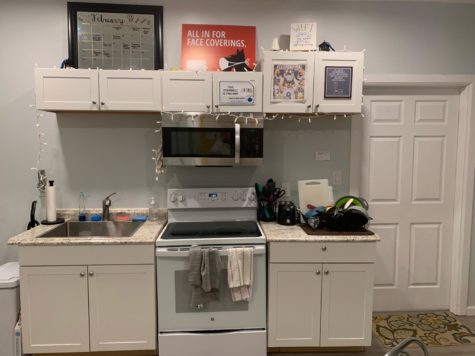Your donation will support the student journalists of Wylie E. Groves High School. Your contribution will allow us to purchase equipment and cover our annual website hosting costs.
Alumni help students navigate college planning
January 17, 2022
Rejection. Picking the right college. Communities on campus. Budgeting for college life. Scheduling and roommates. 60 students responded to a poll this month that showed they craved information on these topics as they left high school and embarked on their college careers.
Groves alumni have offered their advice to help students navigate admissions decisions, unpleasant roommates, and everything in between.
Rejection
“We regret to inform you”
Five words no senior wants to read. Five words students fear will bring the efforts of their academic career to a halt. Five words often force students to rethink the future they imagined. While college is a hot topic for the senior class, rejection is hardly talked about. Most students don’t even want to imagine being declined by their dream schools, but what happens when this nightmare becomes a reality?
To University of Michigan sophomore Erin Roberts, life goes on. She was rejected from her dream school: Yale. However, after a year on campus at the University of Michigan, Roberts believes her rejection was for the best.
“Being rejected from college can be an incredibly scary thing. I didn’t get into my top school of choice and I was absolutely devastated. But, now that I am at the University of Michigan actually living the college life, I can’t imagine being anywhere else,” Roberts said.
Roberts wants seniors to know that rejection is unavoidable. To her, it’s not something to fear. Instead, she wants students to face college decisions with the understanding that it will all work out in the end.
“Rejection happens to the best of us, we all have to face it at some point, but don’t go forward afraid of where you won’t get into. Keep your head up and know that you will end up where you are meant to be,” Roberts said.

This outlook is a common theme amongst college students who stray from their ideal path. Ranging from the cost of attendance to specific majors, many factors place dream schools out of reach for students. Sophomore at the University of Pittsburgh Kayla Kendricks faced this dilemma after receiving a delayed decision from her number one school in June 2020.
“I didn’t get into my top choice, which was Tulane. I was deferred and then by the time they accepted me, it was too late. It hurt. I felt defeated, in a sense, but then I realized I had other options. Other schools were probably going to give out better financial aid packages anyway. You just have to keep going. Maybe you got deferred for a reason,” Kendricks said.
Being deferred gave Kendricks a new perspective, one that allowed her to fairly evaluate the other schools. While it wasn’t initially on her radar, the University of Pittsburgh stood out as the obvious choice after Kencricks toured the campus.
“You always want to have the backup. Once you look at the campus and see the possible majors, you can see yourself being successful. That was one of the things that I had to think about when I chose the University of Pitt. After I toured it, I could see myself thriving there,” Kendricks said.
Senior Sara Carlton was also deferred from Tulane, but she remained optimistic for other reasons. To Carlton, a deferral is not the end of the world. After receiving her first rejection letter shortly before her Tulane decision, she was relieved to have received a second chance.
“Earlier that day, I got my first rejection letter. So, I was already feeling down. I thought ‘I’m probably gonna get rejected by them too’. But I got deferred, which was a little bit of a relief because it’s not a rejection. They need to reevaluate you. It doesn’t feel good to be deferred, but at the same time, it doesn’t feel bad either,” Carlton said.
She sees her deferral as another opportunity to make an impression on the admissions committee. She went to Tulane’s website to get advice on what to do after being deferred. She wants seniors to know that there are resources available to help improve their application.
“Every college is different. Some schools don’t have a continued interest form. Some do. Some want you to send emails instead. You can do research on what they want you to do after you are deferred. Usually, their websites have a deferment policy and you can go through that. For Tulane, the only piece of information they needed was a continued interest form. So, I filled that out. I gave an update on my senior year, grades, classes I’m taking, and some of my plans for the future. I also said what I would do with an education from Tulane,” Carlton said.
Regardless of Tulane’s decision, Carlton is confident that she will end up where she needs to be. She feels that rejection has a negative stigma that leads students to feel unnecessary shame. She wants students to know that everyone will face rejection at some point.
“We should stick together, rather than like tearing each other down. If you got a really selective school that a lot of people want to go to, you should not boast about it. That could have been someone else’s dream school, and you just don’t know,” Carlton said, “No one wants to talk about getting rejected. It’s not something you want to share, but I feel like it should be talked about more because it’s gonna happen to everyone. Everyone applied to a handful of schools. Everyone gets rejected. It’s a normal thing. If you get rejected from a school, I think whatever’s meant to be will happen at the end of the day.”
Picking a school
Choosing a school to apply to is entirely different from choosing a school to attend. While college applications have little to no risk, college decisions require a bigger commitment. To make an informed choice in a school, students have to consider multiple factors that each carry their own level of importance. Navigating so many components leaves students confused about where to start.
Roberts urges students to begin by considering what they want out of their college experience. Developing a list of criteria can help seniors determine what school is best for them.
“You are paying for college so make it what you want. Prioritize the things that you expect to have when you are paying for your education. Does the school have the major you are looking for? Does it offer a sport or club you want to join? Do you want to go to a D1 school with a party scene, or a small school with smaller classes to aid you in your education? There are a lot of important factors,” Roberts said.
With plans to go to graduate school, Carlton took her college research one step further into the future. She made sure to apply to schools that set her up for success after graduation.
“I wanted something with a good program for what I want to go into. My major is biochem, so I wanted something with a good graduation rate and a good grad school acceptance rate. So, I did a bunch of research on that,” Carlton said.

Sixty Groves students were asked to rank their top four college concerns. Over 50% of students placed either the cost of attendance or acceptance rates as their number one worry. (Joelle Allen)
Like many seniors, Carlton’s decision will be largely influenced by her college expenses. While most students apply to five or six institutions, Carlton applied to thirteen schools. She says having so many options will give her a better chance at finding an affordable school.
“Paying for college is going to be a little bit of an issue. I’m 18 and my parents said they would help, but not with everything. Obviously school is very expensive. So, I wanted to apply to as many reach schools as I could so I could get the cheapest, best education I could next year,” Carlton said.
Kendricks agrees with this philosophy. Through financial aid packages and work-study opportunities, Kendricks was able to afford the out-of-state tuition for the University of Pittsburgh. She advises seniors to place the cost of attendance as their top priority. She wants students to have the same opportunities to leave the state while maintaining realistic expectations.
“Financial aid should be a huge factor in determining colleges. You don’t want to be taking out a lot of loans and stressing about them as you get into your 30s and 40,” Kendricks said.
Roberts had a different approach towards making her decision. She focused on other factors, prioritizing things like location, student clubs, and academic programs to help her rule out certain colleges on her list.
“I fell in love with Kalamazoo College. I nearly decided to go there because, as a senior, I thought I might major in something other than architecture. Kalamazoo is an amazing school, but the lack of an architecture major or a water polo team is what made me decide against it. The University of Michigan, on the other hand, had everything I was looking for. It allowed me to explore my options and be indecisive in my major,” Roberts said, “I was also attracted to the integration of the school within the city of Ann Arbor. I didn’t want to feel like I was in school all the time. Michigan had a lot to offer and I felt that I could make the most of my 4 years here, that’s what sold it for me.”
Housing
Dirty dishes pile in the sink. Smelly laundry covers the floor. Strangers wander in and out as they please.
Replying with their biggest concerns about college dorms, fifty-two Groves students all revealed the same truth: no one wants a messy roommate.
With two roommates, Kendricks has learned a lot about cooperating with others. While one of her roommates is a close friend, the other has created tension in their apartment by refusing to help clean.
“I have two roommates. One that I love and one that I don’t really care for. They were my neighbors from last year at the hotel I dormed in. The roommate I don’t care for doesn’t clean her mess or anything. We tried to have a cleaning schedule on the calendar, but the one roommate didn’t want to follow it, so now we only post-national holidays on it,” Kendricks said.
Kendricks keeps from making the situation worse by keeping to herself and avoiding her roommate entirely. As an active student, she spends most of her time around campus and exploring Pittsburgh. She wants seniors to know that having a messy roommate is not the end of the world.
“If you have a bad roommate, just ignore them as much as you can and know for sure that they won’t be your roommate for the next four years,” Kendricks said.

Carlton has found social media to be a useful resource when looking for roommates. Set up to mimic dating websites, Instagram accounts and Facebook groups have been set up to match potential roommates together. Being able to screen other students has reduced Carlton’s concerns about housing.
“There’s a lot of support to find, like a good roommate. There’s Facebook groups for students and stuff like that. But at the end of the day, you can switch roommates,” Carlton said.
While these social media pages can help students avoid uncomfortable housing situations, knowing the right questions to ask has proved to be an even bigger help to Kendricks. She strongly advises that students look for roommates with similar academic goals and personal values.
“You want to make sure you’re compatible, but not too compatible. Maybe you want the same major, just so that you can help guys help each other out. Ask them what their typical Friday, Saturday, or even Thursday night is. Do they like to clean? Do they smoke or drink? Are they interested in joining Greek life? That’s a big one if you don’t want a lot of people in your room,” Kendricks said.
Kendricks stressed the importance of having roommates that respect your boundaries when it comes to drinking, smoking, and partying. Students can avoid these conflicts by getting a good idea of what their roommate wants out of their college experience.
“If you’re not a party person, you don’t want somebody that’s partying and then coming home late and bringing people home. So just asking questions to establish basic respect between the roommates,” Kendricks said.
Roberts agrees that knowing your potential roommate’s priorities can make all the difference in your next year on campus, however, she believes that it’s okay to have a roommate that’s different as well.
“Try to find someone with similar interests, but also someone who might be in a different major than you. Having the same major as your roommate can seem beneficial in some ways, but when your entire world is your major it can become a little suffocating. Find someone who likes something that’s new to you and take the opportunity to learn from them,” Roberts said.
Balancing growth and comfort can be difficult for college freshmen, but asking the right questions and finding common ground with a roommate can be a great way to set oneself up for success.

Roberts also utilizes all of the benefits that come from living in a dorm. She found dining halls to be her saving grace when it came to budgeting for college expenses.
“Ann Arbor is a city. It’s expensive. People need to research ahead of time to make sure they are choosing what they want, what they need, and what’s affordable. In the beginning, I ate at places around campus, but I began to realize how much was adding up. I found it best to stick to the dining hall. If you live in the dorms, you are already paying for the food so you should make it work,” Roberts said.
Kendricks, however, struggled to fit dining halls in her busy schedule. She found it impractical to sit for every meal. Instead, she says that students should be prepared to constantly be on the go.
“I would recommend that you gauge how much you eat. I know that some people aren’t gonna eat three times per day. They only get in one really good meal, then they snack all day. So, for that kind of person, I would recommend they get one meal per day on their meal plan,” Kendricks said, “ and just get a whole lot of dining dollars, which is money that applies to any restaurant or grocery store on campus.”
Adjusting to Life on Campus
Move-in day.
For many college freshmen, the reality of being a college student doesn’t begin until they’ve moved into their dorm. The independence and freedom that come with being away from home can easily become overwhelming. Roberts believes that the easiest way to adjust to life on campus is through joining social groups.
Despite being rejected from her dream school, Roberts found her place at the University of Michigan. Joining clubs helped her transition into her new community on campus. She wants seniors to take advantage of the resources offered to freshmen.
“There are plenty of opportunities to join clubs across any campus. Most schools have some sort of festival or club fair where all of the students get the opportunity to learn about all of the clubs offered at their school. I am currently a member of my school’s club water polo team and a representative for the Residence Hall Association in my building. I am also a hall council member,” Roberts said.
Being an active member in the community on campus offers multiple benefits. Roberts has found that her clubs have helped the most when it comes to socializing outside of class.
“Being a part of a team is always beneficial, especially in making friends. The bond you create with people you are working and practicing with 3-4 times a week is something you can only experience as a member of a team. It also creates space for you to breathe and relax outside of your academic life,” Roberts said.
Her role as a hall council member has also helped her learn skills that apply to her career goals.
“As an RHA rep, I have learned a lot about behind-the-scenes work when it comes to organizing for, negotiating on behalf of, and representing a body of students. This has been beneficial because I am considering a minor in political science,” Roberts said.
Kendricks has used her major in chemical engineering to widen her social circle as well as to network with other STEM majors. Networking has become a lifeline for Kendricks as an out-of-state student.
“I joined a lot of clubs. It was mostly through clubs and organizations, and then also having similar majors that I was able to make a lot of good friends. Even if you’re not looking for clubs and organizations to join, I will suggest that you create a social network with people through Instagram and Twitter. Even walk around your dorm to network with people,” Kendricks said.
As a minority at a predominantly white institution, Kendricks has also sought out communities specifically for African-American students.
“I am a part of RISE, which stands for Reaching Inside your Soul for Excellence. It’s mainly for students to do homework. We also have to network with other students in the club; majority of us are African Americans. I’m also in NSBE, which is the National Society of Black Engineers. Also, about four people suggested a sorority to me. I wasn’t interested in greek life until recently, but I’m going to join a sorority. Phi Sigma Rho, is for women in STEM. I’m very excited to join that,” Kendricks said.
Having communities centered around her major has helped Kendricks adjust to the workload of a college student. Another tool that she has used to set herself up for success is creating a class schedule that works best for her.
“In high school, you would be forced to go to school between 8:00 am and 3:00pm. Then you’d do your homework and study between 3:00pm and 12:00 am. But in college, you can study throughout the day, or whenever you don’t have class. Which is very helpful. If you are a morning person, I suggest you just get class out the way first. If you like to wake up later, you would probably try and spread classes throughout the day,” Kendricks said.
Carefully planning a schedule can make adjusting to college life easier for freshmen. Without the consistency of Groves’ daily schedule, Roberts found herself struggling to balance school and other interests.
“The hardest part about adjusting in college, in my opinion, is finding the work-life balance that works for you. In high school, your entire schedule is laid out for you for the largest chunk of your day. In college, you may have one class one day and three the next so there is an enormous amount of free time between. It didn’t take long for me to learn that this free time is not always ‘free’ time. Use it to study and do your homework. Otherwise, you will risk falling behind,” Roberts said.
Kendricks was able to avoid this rude awakening because of her experience balancing swim practice and homework. Thanks to her experience at Groves, she has never missed a class or overslept. She says students can do the same by developing healthy habits for time management before they get to campus.
“Swimming helped me learn how to manage my time. We had morning practice and we had afternoon practice. Swimming took a lot of time away from studying and doing homework, and I see a similarity with college now because I’m working and I’m a part of other clubs as well,” Kendricks said.
Carlton feels that the Advanced Placement classes offered have prepared her for the difficulty of college classes. After years of creating challenging course loads for herself, Carlton says that classes are the least of her worries.
“Personally, I did a good job of taking classes that would relate to like my major. I would say that I honestly feel pretty prepared for the workload that I will see ahead of me,” Carlton said.
However, Carlton does regret not taking her grades seriously as an underclassman. Looking back, she understands that it’s never too late to start preparing for college. She wants underclassmen to learn from her mistake and to put themselves in the best position senior year.
“I wish I tried harder freshman and sophomore, and even a little bit junior year. It doesn’t feel real until you’re here. It feels like you’re gonna be in high school forever, but you aren’t,” Carlton said. “This is your future and it’s worth staying up that extra half an hour to do your homework, even when you don’t feel like it.”
Carlton feels lucky to be on the other side of her high school experience. She now finds her daily routine repetitive and she wants something different. As nervous as she may be for her uncertain future, Carlton is intrigued by the idea of a new adventure.
“I’m looking forward to the next chapter of my life. We’ve been in high school for four years now. We’ve been in and out of online school. I’m a little tired of it. I’m ready to work hard for something else,” Carlton said, “I’m ready for the next challenge.”
